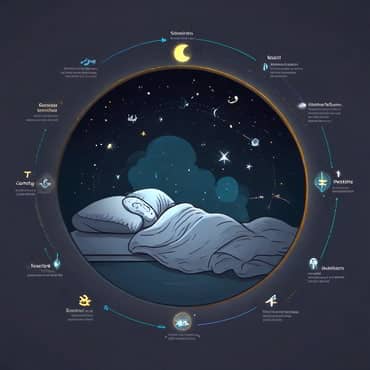How To Increase Deep Sleep Naturally: The Silent Healer

Estimated reading time: 8 Min
This post aims to unveil how to increase deep sleep naturally in order to benefit from deep sleep’s profound value to our health and wellbeing.
Have you ever woken up feeling as if you’ve been gifted a brand new body and mind overnight?
That’s the magic of deep sleep—an elusive state that many of us yearn for but often miss out on.
In our modern pressure cooker world, that buzzes with technology and teems with stress, a good night’s sleep has become a luxury, although in reality it’s a necessity.
The thing is that, within sleep lies a silent healer, capable of restoring your mind and body without uttering a single word.
Here we explore why deep sleep is the cornerstone of a vibrant, healthy life.
The Science of Sleep and Sleep Cycles
To appreciate the value of deep sleep, it’s essential to first understand the architecture of sleep itself.
Sleep is not a uniform state of rest but a complex cycle of different stages, each serving a unique function in our body’s restorative process.

The cycle consists of light sleep, deep sleep (also known as slow-wave sleep), and REM (Rapid Eye Movement) sleep.
Deep sleep is the most rejuvenating phase, where the body, with the help of the brain, repairs muscles, regenerates tissues, and strengthens the immune system.
During this stage, brain waves slow down dramatically, and it becomes harder to wake up, indicating the body’s focus on internal healing and rejuvenation.
But do realise that we are all, a little at least, different.
Sleep occurs in cycles that are personal, lasting from between about 45 and 90 minutes.
This is why when you wake up naturally and wake up the person next to you, they can be grumpy; the thing is that they probably experience a different rhythm to their sleep cycle.
The Benefits of Deep Sleep
Deep sleep benefits include being like a nightly spa treatment for your brain and body.
Physically, it’s the time when the body repairs itself.
Growth hormone, essential for muscle growth and tissue repair, is released predominantly during deep sleep.
This phase is also critical for energy restoration, allowing you to wake up feeling refreshed and revitalised.
Mentally, deep sleep plays a pivotal role in memory consolidation, the process by which short-term memories are transformed into long-term ones.
It’s also vital for emotional regulation, helping to process and neutralise the day’s emotional experiences.
Studies suggest that adequate deep sleep enhances learning, problem-solving skills, and creativity, proving that a good night’s sleep can indeed make you smarter and more innovative.
How Much Deep Sleep Do You Really Need?
While sleep needs vary by individual, most adults require between 7 and 9 hours of sleep per night, with approximately 20–25% of that time spent in deep sleep.
Children and teenagers, undergoing rapid physical and mental development, need even more.
The challenge is that as we age, we naturally spend less time in deep sleep.
The signs of deep sleep deficiency include daytime drowsiness, difficulty concentrating, and heightened emotional reactions, among others.
Barriers to Deep Sleep
Our modern lifestyle is often at odds with the natural processes governing sleep.
Stress and anxiety top the list of sleep saboteurs, with the mind’s tendency to ruminate at night acting as a barrier to deep sleep.
The blue light emitted by screens can also disrupt our natural sleep-wake cycles, tricking our brains into thinking it’s still daylight and thus reducing melatonin production, the hormone responsible for sleep.
Diet and exercise play significant roles too.
Caffeine and alcohol, particularly when consumed late in the day, can dramatically impact sleep quality.
Similarly, exercising too close to bedtime can leave the body too energised to settle into deep sleep, despite exercise being beneficial for sleep overall.
Recognising the Silent Thieves
Beyond lifestyle factors, certain sleep disorders and environmental conditions can steal away deep sleep without us even realising.
Conditions like insomnia, sleep apnoea, and restless legs syndrome directly interfere with the ability to enter deep sleep stages.
Environmental factors such as noise, excessive light, and an uncomfortable bedroom temperature can also disrupt the sleep cycle, preventing the body from achieving the deep sleep it needs to repair and restore.
By being aware of these aspects of the science of sleep, and recognising the barriers to deep sleep, we can begin to take steps towards embracing the silent healer that works tirelessly in the shadows of the night.
In the following sections, we’ll explore practical strategies to optimise your sleep environment and habits, ensuring you get the deep, restorative sleep to maintain the energy levels your body and mind deserve.
Embracing the Silent Healer: Start With Preparing the Mind
In the quest for deep sleep, calming the mind is just as important as preparing the body.
Techniques like meditation and mindfulness can significantly reduce stress levels, making it easier to drift off into deep sleep.
Establishing a pre-sleep ritual, such as reading a book, taking a warm bath, or practicing gentle yoga, can signal to your body that it’s time to wind down.
Consistency is important; I know that’s a challenge for many, but if you can stick to a routine, you’re training your body to recognise when it’s time for rest.
Optimising Your Sleep Environment

The setting in which you sleep can profoundly impact your ability to enter deep sleep.
Aim for a bedroom that’s cool, quiet, and dark, as these conditions support the body’s natural sleep processes.
Investing in a high-quality mattress and pillows can also make a significant difference, providing the physical support your body needs to fully relax and enter the deepest phases of sleep.
Nutrition and Exercise for Better Sleep
What you eat and how you move can pave the way for better sleep.
Focus on a balanced diet rich in fruits, vegetables, whole grains, and lean proteins, particularly those containing sleep-promoting nutrients like magnesium and melatonin.
Avoid heavy meals and stimulants close to bedtime.
Regular exercise, ideally in the morning or afternoon, can help regulate your sleep patterns and improve sleep quality, making deep sleep more accessible.
Advanced Strategies Including Technology for Deep Sleep
Nowadays, technology offers innovative solutions to improve sleep quality.
Sleep trackers and apps can provide insights into your sleep patterns, helping you identify potential issues and improvements.
Devices such as white noise machines and smart mattresses can also enhance your sleep environment, promoting deeper sleep.
Seeking Professional Help
If sleep remains elusive despite your best efforts, it might be time to consult a sleep specialist.
Sleep disorders, such as sleep apnoea and insomnia, can severely impact your ability to reach deep sleep.
A healthcare professional can offer tailored advice and treatment options, from cognitive behavioural therapy to medical interventions.
FAQs
What is the easiest way to increase deep sleep?
Increasing deep sleep starts with improving sleep hygiene. This includes establishing a regular sleep schedule, ensuring your bedroom is conducive to sleep (cool, dark, and quiet), and avoiding stimulants like caffeine and electronics before bedtime. Incorporating relaxation techniques such as meditation or deep breathing exercises can also prepare your mind for deeper sleep.
Can diet affect the quality of my deep sleep?
Absolutely. Your diet plays a crucial role in sleep quality. Foods rich in magnesium, potassium, and calcium can promote muscle relaxation and better sleep. Additionally, tryptophan-rich foods, such as turkey and dairy products, can increase the production of serotonin, which is then converted into melatonin, the sleep hormone. Avoiding heavy or large meals within a couple of hours of bedtime is also recommended to prevent discomfort that can impede deep sleep.
How does exercise impact deep sleep?
Regular exercise can significantly improve the quality and duration of deep sleep by reducing stress and anxiety, which are common barriers to deep sleep. However, timing is key; exercising too close to bedtime can be stimulating, so aim to complete any vigorous activity at least three hours before you plan to sleep.
Is it normal to wake up during the night?
Yes, it’s normal and common to wake up briefly during the night, often during transitions between sleep cycles. Most people fall back asleep quickly and don’t even remember waking up. If you find yourself waking up frequently throughout the night and have trouble falling back asleep, it could be a sign of a sleep disorder or poor sleep hygiene.
What should I do if I can’t fall asleep?
If you can’t fall asleep after 20 minutes, get out of bed and do something calming, like reading under soft lighting. Avoid screens, as the blue light can make it harder to fall asleep. This helps break the association between being in bed and feeling awake. Return to bed when you feel tired, and maintain a regular wake-up time to help reset your sleep cycle.
Summary: How To Increase Deep Sleep Naturally
Deep sleep, the silent healer, plays a critical role in our physical and mental health.
By understanding its importance and the factors that affect it, we can choose to take proactive steps to embrace its restorative power.
From optimising our sleep environment and habits to seeking professional advice when necessary, there are numerous ways to enhance the quality of our sleep and, by extension, our lives.
Now, I invite you to join the conversation.
Have you discovered any personal tips or strategies that have improved your deep sleep?
Share your experiences in the comments below.
Why not take the first step?
Transform your nights into a time of true restoration and healing.
By joining an environment of sharing and learning, we can all benefit from the collective wisdom on how to harness the power of deep sleep.
😉
Richard
Resources
- Walker, Matthew. “Why We Sleep: Unlocking the Power of Sleep and Dreams.” This book provides an in-depth look at the importance of sleep, backed by years of research.
- National Sleep Foundation. “National Sleep Foundation’s Sleep Quality Recommendations.” An organization dedicated to improving health and well-being through sleep education and advocacy.
- Harvard Medical School. “Improving Sleep: A guide to a good night’s rest.” A comprehensive guide offering tips for better sleep from one of the world’s leading medical institutions.
- The Sleep Council. “The Good-Night Guide.” An informative guide with tips on how to get a better night’s sleep, suitable for anyone looking to improve their sleep quality.
- American Sleep Association. “Sleep and Sleep Disorder Statistics.” Offers a broad range of information on sleep health and sleep disorders.
Realise that while the journey to better sleep can be personal and vary greatly from one individual to another, the benefits of deep sleep are universal.
Here’s to a night of deep, restorative sleep!







This article on solo business time management was really practical—loved the tip about batching administrative tasks. I’ve struggled with balancing client work and paperwork, so I’ll definitely try this approach!
Thank you Jeannia! Your response is appreciated. Please let me know how it goes. 😉 Richard
Please send some information to my email
Hi Kimberly. It’s good to meet you. I have subscribed you to my email course since that will probably answer your questions. 😉 Richard
GOOD
Hi Ryan. Thank you for that feedback. I see you applied to subscribe to my email series. Remember to ask any questions that arise. 😉 Richard